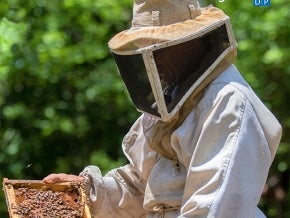
The global commons are being pushed to breaking point, so coalitions are forming to protect them and to build lasting prosperity
My country, Japan, was long dependent on fishing. In the past, every fisherman in a coastal community would be tempted to catch as much as possible. When everyone did so, the fish – the village's common shared resource – disappeared. The result? Poverty and misery for everyone.
But this did not happen in every village. In others, the fishermen – realising that they relied on a finite, shared resource – developed a kind of contract among themselves and with their environment under which each held back a bit to prevent overfishing.
They would keep an eye on each other and any cheating would be penalised. But the incentive to cheat fell dramatically as everyone realised that the contract enabled them and their descendants to go on using their common resources sustainably far into the future.
Both stories were repeated all over the world. Many communities trashed their resources for short-term gain, in what has been called the tragedy of the commons. But others changed their behaviour in this way, enabling villagers in medieval Europe to manage pasture and forests, communities in Asia to manage water, and indigenous peoples in the Amazon to manage wildlife.
Yet these life-and-death dramas were played out on local stages. Even the tragedies did not fundamentally affect the world's natural systems. Despite local depletions, there were literally, still plenty of fish in the Earth's seas: vast areas remained for grazing worldwide. Such global commons as the oceans, soil and the atmosphere were left generally intact.
Now our economies have become global, but the principle of taking care of common resources has not. The whole world faces the tragedy of the commons. The global commons, on which all humanity depends, are being pushed towards breaking point, posing an ever-increasing threat to our aspirations for economic growth, jobs and security.
Scientists have defined nine “planetary boundaries” that determined the ecologically stable global conditions of the last 12,000 years, which enabled all civilisations to take root and thrive. Four of these have now been transgressed: others are expected to be breached in future.
Five hundred “dead zones” are strewn through the seas: 85 per cent of global fish stocks are fully exploited or depleted. Thirty per cent of global forest cover has been felled, while a quarter of the globe's land area – on which 1.5 billion people depend for sustenance – is being degraded.
Last autumn the Intergovernmental Panel on Climate Change confirmed that people around the world are already experiencing the ill-effects of global warming through sea-level rise and more extreme droughts and storms – and that we have only about a decade to sharply decarbonize our economies.
Our attempts so far at changing course have not succeeded. We have relied heavily on top-down international treaties to regulate our activities. The 1992 Rio Earth Summit, for example, adopted three – to tackle climate change, land degradation, and the loss of biodiversity and wild species. The results have, to varying degrees, been disappointing. Despite the progress made, incremental steps will not suffice. The only hope lies in transformational – and permanent – change.
We need a new way of doing business. We must recreate the same kind of contracts that local communities found so effective in the past. But we must do so on a global scale – building new coalitions and partnerships to transform the key economic systems that support how we eat, how we move and how we produce and consume.
We need to green our cities, fix our food system, decarbonise our energy system, and make our take-make-waste economies more “circular”, reusing and recycling materials and minimising pollution.
The coalitions must be broad, stretching well beyond green activists and environment ministries. They need to bring together business, researchers, communities and local and national governments on common platforms to align stakeholders around global issues.
The good news is such coalitions are already forming. Smart coalitions, nimble networks and productive partnerships are emerging everywhere, as an unprecedented action-orientated “start-up” culture is beginning to make rapid progress. They are becoming increasingly influential.
To take just a few examples: the Tropical Forest Alliance – consisting of more than 150 companies, governments, civil society organisations, indigenous peoples' groups and international organisations – is tackling deforestation across three continents.
The Food and Land Use Coalition is bringing together scientists, farmers, investors, policy makers, businesses and both international and grassroots organisations to feed a growing population while regenerating natural resources.
The Platform for Accelerating the Circular Economy – a public-private collaboration which I co-chair with the CEO of Philips and the executive director of UN Environment – is working to transform the prevailing take-make-waste economic system. The Global Plastics Action Partnership is mobilising businesses and countries to tackle the scourge of plastics in the oceans.
Meanwhile, more than 600 cities reported important steps to tackle climate change last year and more than 500 of the world's largest companies have committed to science-based targets to combat it. And, this is just the beginning: work is underway to establish similar targets for all the global commons.
Building broad coalitions is not easy. It requires participants to leave their silos and move out of their comfort zones, and involves consultation, negotiation, and a shared long-term view. But we need such coalitions if we are to fundamentally shift markets in a way that allows for continued expansion of economic opportunities while at the same time protecting our global commons.
If done right, we can turn the tragedy of the global commons into an opportunity. The innovation required would provide a powerful business stimulus and lay the foundation for lasting prosperity. Two years ago, the Business Commission on Sustainable Development – mainly consisting of over 25 chairs and CEOs of world-leading companies – identified at least $12 trillion of marketing opportunities in such a change. Protecting and enhancing the global commons is the wisest investment that can be made.
The Global Environment Facility is ready to act as a catalyst to help make this happen. The world's governments have just replenished its funds to the tune of $4.1 billion for a new four-year investment cycle, with safeguarding the global commons at its heart.
Business leaders have told me that this is exactly what they have been waiting for. That's no surprise, when operating within the planetary boundaries is not just the only way to ensure healthy economies but to provide much greater and better-shared growth.
This piece was originally published for the GEF-Telegraph Partnership.



Comments
Great Steps! and the best way to go to protect ourselves and safeguard the planet earth for future generation. With such formidable Plans of Action and financial commitments ,the three stratgies and partnership modalities will see us through.
For someone at Rio in 1992 seeing these emerging scenarios, am glad there is a great future.
Please let us unite as we turn these seeming tragic emerging events into global opportunities for all. Again ,I say Kudos to the GEF CEO, Naoko and her global team for a job well done..
We all look forward to successful implementation of the GEF-7Agenda for the food of all as we partner and collaborate for results.
I’m deeply touched and moved by this well written article. In my own little way, as monitoring adviser of a GEF funded project, will ensure efficient use of resources to generate results beyond the boundaries of the project document but fully aligned in contributing to this purported global vision.
More power to you GEF CEO.